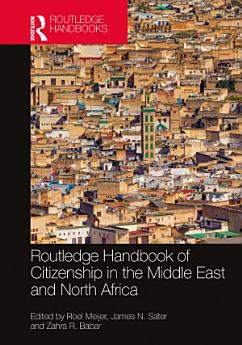Routledge Handbook of Citizenship in the Middle East and North Africa
About this ebook
The terms citizen and citizenship are mostly used by researchers in an off-hand, self-evident manner. A citizen is assumed to have standard rights and duties that everyone enjoys. However, citizenship is a complex legal, social, economic, cultural, ethical and religious concept and practice. Since the rise of the modern bureaucratic state, in each country of the Middle East and North Africa, citizenship has developed differently. In addition, rights are highly differentiated within one country, ranging from privileged, underprivileged and discriminated citizens to non-citizens. Through its dual nature as instrument of state control, as well as a source of citizen rights and entitlements, citizenship provides crucial insights into state-citizen relations and the services the state provides, as well as the way citizens respond to these actions.
This volume focuses on five themes that cover the crucial dimensions of citizenship in the region:
- Historical trajectory of citizenship since the nineteenth century until independence
- Creation of citizenship from above by the state
- Different discourses of rights and forms of contestation developed by social movements and society
- Mechanisms of inclusion and exclusion
- Politics of citizenship, nationality and migration
Covering the main dimensions of citizenship, this multidisciplinary book is a key resource for students and scholars interested in citizenship, politics, economics, history, migration and refugees in the Middle East and North Africa.
About the author
Roel Meijer is Associate Professor in the Department of Philosophy, Theology and Religious Studies at Radboud University, Nijmegen. He is a historian and has edited numerous volumes, including Global Salafism: Islam’s New Religious Movement (2009), The Muslim Brotherhood in Europe (2012), and (with Nils A. Butenschøn) The Crisis of Citizenship in the Arab World (2017) and The Middle East in Transition: The Centrality of Citizenship (2018).
James N. Sater is Associate Professor at the Department of International Relations at the University of Malta. He is the author of Morocco: Challenges to Tradition and Modernity (Routledge 2010/16) and Civil Society and Political Change in Morocco (Routledge 2007). He has worked on sectarianism, citizenship, electoral politics, gender, marginalisation and migration with a focus on North Africa and Arab Gulf monarchies.
Zahra R. Babar is Associate Director at CIRS at Georgetown University in Qatar. She has published several articles on citizenship, including "Enduring ‘Contested’ Citizenship in the Gulf Cooperation Council" in The Middle East in Transition: The Centrality of Citizenship (2018); "The ‘Enemy Within’: Citizenship-Stripping in the Post-Arab Spring GCC" in Middle East Journal (2017); and "The Cost of Belonging: Citizenship Construction in the State of Qatar" in Middle East Journal (2014). She served as editor for a special issue of the Middle East Journal titled "Citizenship" (2019).




